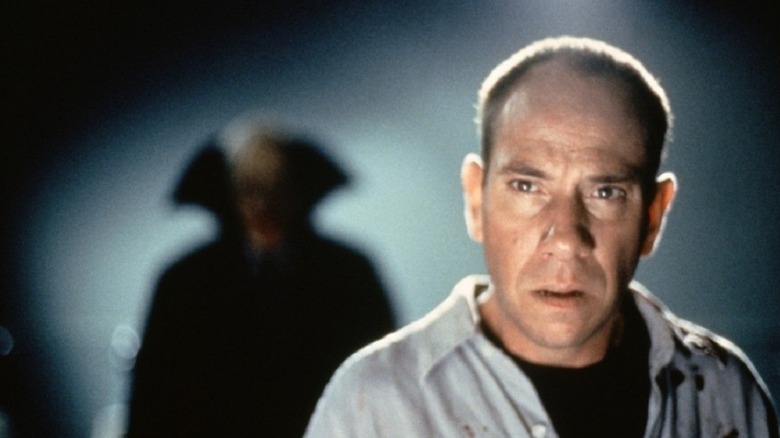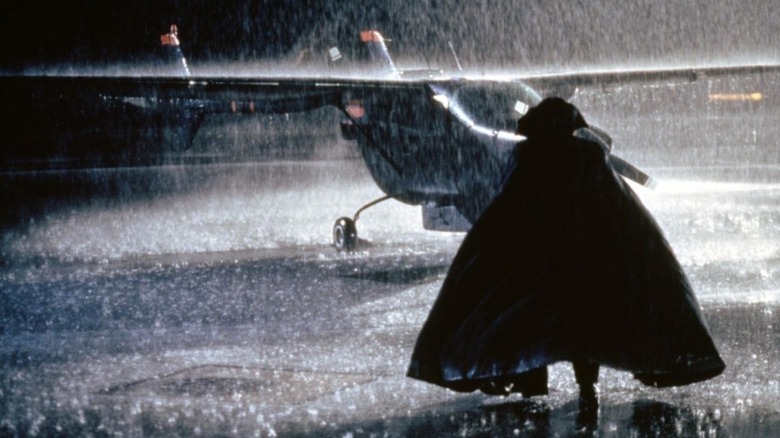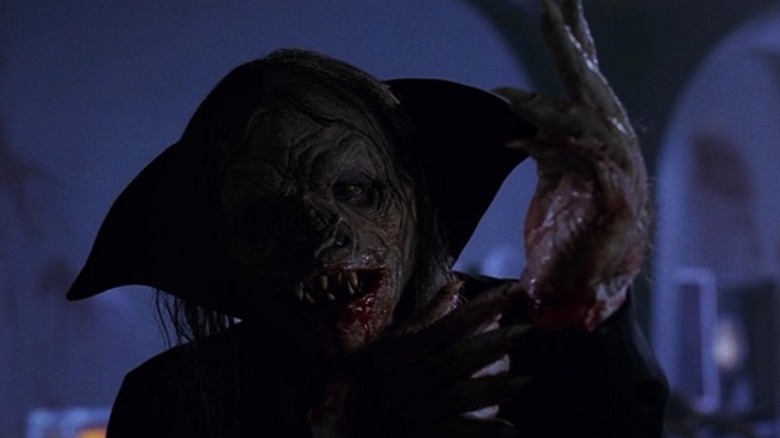Why Stephen King Had To Give Up On A Sequel To A Cult Favorite Vampire Movie
In 1988, a horror anthology titled "Prime Evil: New Stories by the Masters of Modern Horror" was published, where most of the featured short stories were original to the collection. Many gripping stories were a part of this anthology, including Peter Straub's heartbreakingly poignant "The Juniper Tree" and Clive Barker's overlooked, introspective "Coming to Grief." But a late '80s horror anthology is incomplete without Stephen King, and sure enough, his horror short story "The Night Flier" graced the pages of this collection. King's writing in this super short, yet effective story is a tad different than his usual style: it is more chaotic without a method to ground it, but this ends up complimenting the fantastical nature of the story. After all, "The Night Flier" is a vampire tale, with King exclusively exploring tropes associated with this sub-genre.
Vampires don't feature as prominently in King's work as compared to, say, someone like Anne Rice, but a significant number of stories incorporate this fictional beast and the specific connotations King attaches to it. "Salem's Lot," "The Dark Tower," and "Wolves of the Calla," are only a few examples, but "The Night Flier" approaches the trope in a rather unconventional way. The story opens with tabloid reporter Richard Dees chasing leads for a column about the Night Flier, a serial killer responsible for gruesome deaths. While Richard's tabloid leans towards trashy, sensational material, he approaches the case with the notion that the killer thinks that he is a vampire — a deduction based on the evidence left at crime scenes.
As with most of King's work, "The Night Flier" got the feature film adaptation treatment in 1997, with the eponymous movie premiering on HBO and receiving a limited theatrical release shortly after. The film performed poorly (more on this later), grossing a mere $210,426 across 91 theaters in the United States. A sequel was planned, with King being interesting enough to co-write the script with director Mark Pavia, who helmed and co-wrote the 1997 adaptation. Unfortunately, this didn't come to pass. What happened here?
The Night Flier director Mark Pavia struggled to finance its sequel
The reasons behind Pavia's adaptation performing so poorly can be chalked up to several factors. For starters, "The Night Flier" was an independently financed project that initially attracted interest from studios like Paramount Pictures, but schedule conflicts and contractual obligations hindered this business deal. After the film's HBO premiere, New Line Cinema picked it up and subsequently facilitated a limited theatrical release.
We know what happened next: the film flopped while being critically panned due to its empty recreation of the source material. However, the film has been re-evaluated over the years, with well-deserved praise being directed at Miguel Ferrer's performance as Richard Dees, and the film's ability to evoke a one-of-kind creepiness that compliments its dreary subject matter. Gradually, the film became a (minor) cult hit.
Pavia didn't give up on his adaptation despite its unfortunate box office fate, as he started working on a sequel script titled "Fear of Flying" in the mid-2000s. According to Pavia, King had co-written parts of the script with him, as the author was excited by the prospect of a follow-up tale that focused on a different protagonist. Pavia spoke about this experience in a 2017 interview with Blumhouse's "Shock Waves" podcast, stating that King asked producer Richard P. Rubinstein whether he could collaborate with Pavia on the sequel:
"He [King] read it [the sequel script], and he goes, 'This is really good.' He's like, 'Would Mark mind if I started working with him on it?'[...] We were having a hard time getting the budget that was necessary for that movie, which I think was around $10 million at the time. It was infuriating because we all loved it. King loved it."
For context, 1997's "The Night Flier" ends with Richard's death, but novice reporter Katherine Blair (Julie Entwisle) plays an important role by pinning the crimes on Dees, despite knowing that he is not the killer. This bleak ending is meant to cement Katherine as an unethical tabloid reporter who trades her morals for a viral story, highlighting the viciousness of an industry that thrives on sensationalism. The sequel was supposed to focus on Katherine, and both King and Pavia were thrilled to work on a fresh tale that explored parallel themes. Unfortunately, nobody wanted to finance $10 million for a cult DVD film that had bombed so hard. If it's any consolation, this is not the worst Stephen King movie to exist.
The Night Flier is a vampire movie that shatters all genre conventions
Both in King's short story and its adaptation, Richard Dees is not a good man. King drives this home by exploring the deepest recesses of this unsympathetic protagonist, who is as rotten and soulless as the tabloid industry he gleefully works for. Richard is adept at manipulation, willing to go to any lengths to publish a story (think a less complex or interesting version of depraved stringer Lou Bloom in "Nightcrawler"). But King doesn't paint Richard with a broad brush, as this deeply nihilistic and contemptuous man is also truly lost, his humanity buried beneath layers of hardened cynicism. At first, the so-called vampiric murders are only fuel for a lurid story, but later events rattle this man, forcing him to do something he hates: feel empathy for a fellow man.
Pavia's film doesn't approach these threads with the nuance it deserves, but Ferrer's Richard embodies the intricacies of his short story counterpart to perfection. Here, Richard desecrates graves for a quick photo of the victims and bribes his way to gather exaggerated accounts to fatten his flimsy news reporting. But this quickly turns into an unsettling obsession with the killer (who fittingly goes by "Renfield"), and Richard's tunnel vision leads him to an inevitable confrontation with the man he's pursuing. A combination of grounded horror (mutilated bodies and contaminated blood) and supernatural elements (drinking Renfield's blood causes intense hallucinations) make for an intense, frightening sequence that ends with Richard's death. On one hand, Richard did have it coming, but on the other, Renfield flees, presumably on his way to his next batch of victims.
Although Renfield's vampiric appearance seems to be more of an enhanced persona rather than a supernatural identity, his presence is disturbing enough to inject the film with suspense. In the end, our focus remains glued to Richard, the actual bloodthirsty creature who sucks the life out of real-life crimes by embellishing them with falsehoods that sell. His death, however, does not end this terrible cycle, as Katherine takes his place as the new face of unscrupulous journalism. The rest is exactly what you would expect a DVD cult horror to be.


